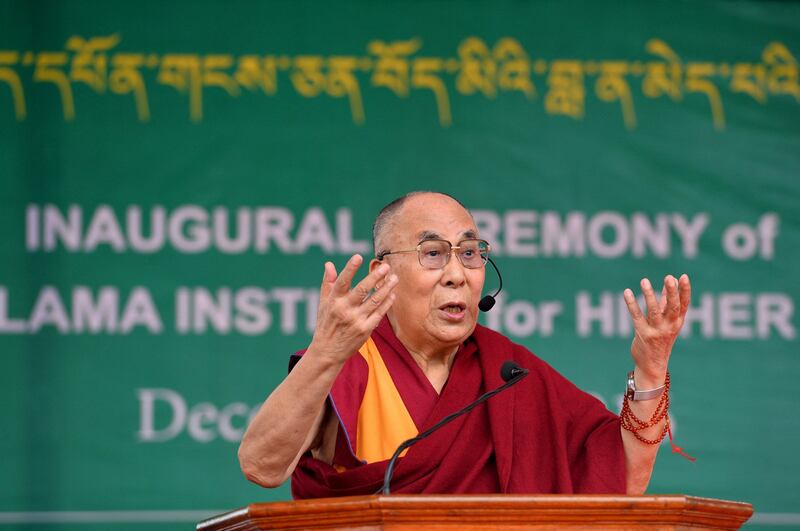The first group of Ph.D. students have graduated from a university promoting the educational and cultural initiatives of Tibetan spiritual leader the Dalai Lama in the southern Indian city of Bangalore.
The seven students were recognized in a ceremony at the Dalai Lama Institute for Higher Education – the first of its kind in the world – on Nov. 30 and met with the Dalai Lama at his residence-in-exile on Monday in the Himachal Pradesh state town of Dharamsala.
The seven received doctorate degrees in the field of Tibetan Studies.
Institute Director Geshe Lobsang Gyaltsen called the milestone “a moment of pride and gratitude for all of us.”
“With years of guidance and support from His Holiness the 14th Dalai Lama and [his younger sister] Jetsun Pema, today we are very happy to celebrate the first batch of seven Ph.D. students graduating from this institute,” the director told RFA Tibetan.
Geshe Lobsang Monlam, one of the graduating students and the founder of the Monlam Tibetan IT Research Center, said the theses completed as part of the doctoral program "will be of benefit as a great source of information,” adding that his own work had focused on a Tibetan digital library and archival conservation of Tibetan cultural and religious resources.

Formed in 2016, the Dalai Lama Institute for Higher Education is part of the Tibetan Children’s Village, a charitable organization for child care and educational services. The institute describes its mission as working to ensure that all Tibetan children under its care “receive a sound modern education and a firm cultural identity, so they can become self-reliant and contributing members of the community and the world at large.”
The Dalai Lama is associated with various initiatives focused on promoting Tibetan culture, language, and values, as well as fostering higher education at institutions including the Dalai Lama Institute for Higher Education and the Central University of Tibetan Studies in the Himachal Pradesh city of Sarnath.
These initiatives are considered vital at a time when Chinese authorities are increasing their grip on Tibet with policies that seek to eliminate the region’s linguistic, cultural and religious traditions, especially among younger generations of Tibetans.
Authorities have eliminated the teaching of subjects in the Tibetan language in schools in the Tibetan Autonomous Region as well as in those in Tibetan-populated areas in China's western provinces. They also have forcibly assimilated more than 1 million Tibetan children into state-run boarding schools.
Another of the Dalai Lama Institute for Higher Education’s Ph.D. graduates, Geshe Lobsang Ngodup, told RFA that he was honored to present his thesis on classical Tibetan grammar and adjective constructions to the Dalai Lama during their meeting this week.
“I hope down the line the younger generations will find [my work] helpful and resourceful in preserving our Tibetan language,” he said.
Translated by Tenzin Dickyi for RFA Tibetan. Edited by Joshua Lipes and Malcolm Foster.
